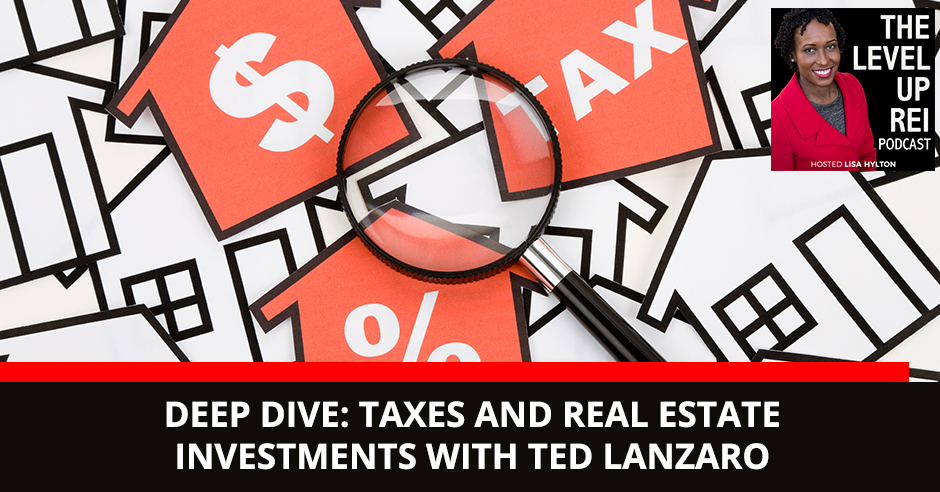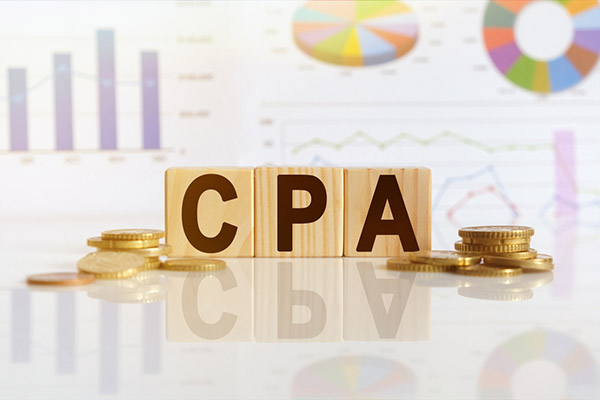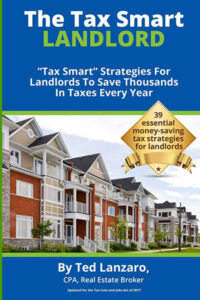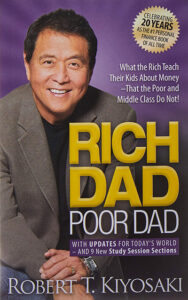
In this episode, Ted Lanzaro of Lanzaro CPA LLC joins Lisa as they deep dive into taxes associated with real estate investments and how you can be a tax-smart landlord. Get to know Ted as he shares his background on real estate investment and some of the lessons he learned in investing in real estate early on. The reason you’re investing passively is for tax-free cashflow. Lisa and Ted talk strategies on passive real estate investment and how Ted looks at deals as a real estate investor and CPA. They discuss the importance of having a CPA specializing in real estate on your team and the need to be familiar with the tax implication when you’re investing in real estate.
—
Watch the episode here
Listen to the podcast here
Deep Dive: Taxes and Real Estate Investments with Ted Lanzaro
I’m super excited to bring to you another amazing guest. His name is Ted Lanzaro. He is a Certified Public Accountant, real estate investor, real estate broker, author and speaker with over 29 years of real estate tax consulting and investing experience. He runs Lanzaro CPA, LLC, a boutique CPA firm, specializing in accounting and taxation for the real estate industry. For the past several years, he has helped thousands of real estate business owners, entrepreneurs and investors all over the United States implement cutting-edge tax strategies that save them thousands of dollars annually on their taxes. He’s also the author of The Tax Smart Landlord and The Tax Smart Landlord toolkit. This has tons of articles on taxation for the real estate industry, specifically for investors, landlords, flippers and developers. I’m excited to have you on the show. Thank you for coming on, Ted.
Thank you, Lisa. I’m excited to be here.
To get started, can you share with my readers how you got started investing in real estate?
Somewhere around 2001, I was working for a big CPA firm in the real estate department working with a lot of real estate clients. A friend of mine from high school came to me like, “You’ve got to read this book.” The book was Rich Dad Poor Dad. I read the book and he’s like, “We’ve got to start investing in real estate.” I said, “My clients are doing well in the real estate market at the time I was living in Southeastern Florida. I don’t have any problem. Let’s look at some properties.” The first day, we went out and we put contracts on three single-family houses near Florida, and we ended up fixing those up and renting them and all of a sudden, we’re landlords. We made a lot of mistakes along the way, but about a two-year period, we picked up a few more houses and a couple of apartment complexes and we’re in the real estate business. About that time, I also started hanging around local real estate investment clubs in the area. They found out networking with other investors and they found out I was a CPA and they asked me what tax strategies was I using for my own investments? I was telling them what I was doing and they’re like, “Would you like to do a presentation for the group?”
I had never done a live presentation ever. I do them second nature now, off the top of my head, but many years ago, I put my PowerPoint together and I was reading in front of a group of 40, 50 investors reading off of my PowerPoint. I had no idea that my knees were knocking, my words and everything. In the end, everybody applauded and I felt good and got a few clients out of it. People wanted and were more interested in hearing what I was doing. It turned into niching my CPA firm, specifically the real estate investors. 2006 or 2007, I moved back up here to Connecticut where I live. I sold my South Florida portfolio at the high point in 2006 and then started investing up here in Connecticut after the 2008 financial collapse. I threw some money into buying some more rentals. I was doing a lot of flipping, bought a lot of single-family houses, fixed them up and sold them and that stopped.
I probably did that for about 8 or 9 years. I’m like, “I’m going to take a break. I’m going to put everything that I’ve learned about real estate investing and real estate taxation into a book,” and that’s how The Tax Smart Landlord. It took me a couple of years on and off to write and then I started doing that all along, picking up and working with real estate investment clients. Nowadays, I do mostly passive investing. I invest a lot of those deals. I don’t have the time to do the leg work I used to do. We’ve got 100 houses, 20, 30 apartment buildings every month. I don’t have that time anymore. Most of the time, I rely on other people to find the deals and then I invest in those deals. Most of my holdings now are passive. From my little office here in Fairfield, Connecticut, I’m running a national tax consulting firm with investor clients all over the country.
Going back to the early days when you were investing, what were some of the lessons that you feel like that experience brought to you, and how that has impacted your current investing strategies?

Real Estate Investments Taxes: Having a CPA background, you’re able to look at the numbers and discern what looks right and what is BS.
One of the dumb things that we did right up front, I had two partners at the time, two guys I went to high school with and we put our names on each of the houses. Each of the first houses we bought, we put all of our names on the mortgages. Five houses in were mortgage down. We’re not getting any more personal loans. That was one of the key lessons. The other key lesson that I learned, and this is particularly relevant nowadays, is to be firm with your tenants when they ask you if they could not pay their rent. This is a dumb realization when I drive by and pick up the rent. I happened to be in Fort Lauderdale with one of my partners. He drove by this guy’s house and we go to pick up the rent. The rent was worth $1,400 a month and the guy hands us $1,200. He gives us $1,400 and then he says, “I don’t have any money to go grocery shopping. Would you mind if I take $200 back and pay you later of the week?” I was about to say no when my buddy said, “Sure, why not?”
As I was kicking him in the leg, the guy took $200 back and we went away short. I got my buddy in the car and said, “Don’t ever do that. This is a business. I felt bad for him too, but it’s a business.” He was $600 short and the next month he didn’t pay his rent. Two months later, we have $5,000. We evicted him. Not only that, but he had referred his cousin who was living in another one of our houses in Fort Lauderdale and he stopped paying his rent. Within 2 or 3 months of that event, we did two evictions. The lesson now is you’ve got to have policies in place for rent collections. The best landlords that I know with the virus situation that we’ll work with, are working with their tenants but they’re also making sure that they’re giving their tenants all the information they need to get assistance from the government, apply for unemployment, all of these things. They’re in the business of helping their tenants get them paid. That’s the new model, unfortunately, at least right now. Those were a couple of lessons that have stuck with me for a while.
You talked a little bit about how you play. You said you play primarily in the passive investing space. Some of my readers are passive investors and being a CPA yourself, what are some of the things you do to get comfortable with the deals that you decide to invest in?
Being a CPA and being a real estate investor, as specialists, you have the advantage of being able to look at numbers and discern what looks right and what is frankly BS. I know when somebody has maintenance, repair, reserve, or too overall vacancy reserve. What I would tell passive investors is one, the reason you are investing. The reason I invest passively is for tax-free cashflow. That’s what I want. I want to get money in my pocket and a K-1 that has a negative number of it. That’s the primary reason I’m doing it. When I invest with somebody, it’s somebody that is able to show me a track record of success with their investments. That doesn’t mean that everything they’ve ever done has turned to gold. I’m wary of anyone who tries to sell me the Midas touch and say, “Everything I’ve ever done has been profitable.” That’s BS. We’ve all been there. I’ve been an investor for many years.
I’ve done investments that cost me money. I’ve done ones that were grand slams. Not every investment is going to be a home run. You’re going to hit a lot of singles and doubles and walk away, to use a baseball analogy, and you’re going to strike out quite a bit. Keep in mind that the person that you’re going to invest in, you want to be able to trust them. You want to know that they’re being transparent with you so they’re giving you the information. You don’t feel like they’re hiding stuff from you. They should be able to show you profit and loss statements from other investments they have. You should feel a level of trust with that person.
Moving more into the realm of tax, because for this episode, what I want readers to take away from this and potential investors is the tax implications of investing in real estate, the things that they need to be looking out for. The first question here is why is a CPA that specializes in real estate important to have on your team as opposed to getting any CPA?
That’s a question I get asked a lot because of a real estate specific CPA, I have a slanted answer, but the idea is because of my experience, I’m able to help people put in place and tailor real estate specific tax strategies to their unique situation. That’s all I do. There’s no one-size-fits-all stuff in my firm. The other thing that I do is I’m proactive with my clients. We’re talking during the year because almost all great tax strategy doesn’t happen when you hand me your info, your W-2s or K-1s in April and March. It happens during the year. I tell people, “Call me when you’re about to buy, sell, renovate a property and invest in syndication. I want to know all of those events and let’s have a conversation about those because all of those are going to affect your situation during the year.”
You've got to have policies in place for rent collections. Share on XThere are a lot of good CPAs out there, but most of them you talk to them once a year, you send them your tax information in March, and they put the numbers on the return. Maybe they give you a little bit of advice and you pay your annual fee and that’s about what most people do. That’s not what I do. I’m working with my investor clients all during the year. I have three calls with three different clients of mine to talk about different things they’re doing and what the tactics are. Most CPAs wouldn’t hear about that until March 2021, but my clients know that if they want to get the best out of me that they need to let you know when they’re doing these things and then we’ll put strategies in place.
The next item, I had an episode with some 1031 exchange people. They went through the whole 1031 exchange process, but the part that I feel I wanted to have good answers on is the tax implications. Especially when you say you’ve been swapping and dropping, swapping and swapping, and you have transitioned, you’ve died. How does that impact your family that you’ve left these properties to? What are the tax implications for your heirs?
Your partnership interest or your property, because it can work both ways. This will tailor the answer not only to your passive investors or partnership interest, but also to people who own buildings in general. Everything gets what’s called mark-to-market at the date of the person who owned its death. On a syndicated deal, your partnership interest has a market value. The market value of the building at the time that you pass multiplied by your percentage interest. If the building is worth $5 million on the day of your death and you own 1% of it, then your interest is worth $50,000, 1% of $5 million. It gets mark into so you have a new basis. Your basis might have been negative at that time, but now you have a new basis. It’s the same thing with a building. What I tell people, especially the ones that 1031 the properties up, typically they’re going to end up working for their debt. They’re going to have a building that has a pretty low basis because they’ve been using 1031 exchanges to level up their investment.
Let’s say you’ve got a building with a cost basis of $1 million from 1031 exchanges, but on the date of your death, it’s worth $3 million. Your heir cost basis is $3 million, the value of the building. They sell it the next day and they sell the building, and right after your funeral, they’re closing. They paid zero capital gains. I know it’s hard, but they would pay zero capital gain on that sale to become the tax law. It’s a great strategy for people that own a lot of properties, who would want to pass it to their children use that step up in basis on the date of death to be able to do that. I see a lot of people make that mistake. They’re trying to give away their assets before they die. When they do that, they give away their properties at their cost basis and they don’t get the step up. It’s much better to do it.
Do they need to move those properties? They should have a will, I’m guessing, set up?
If you’re high net worth, we should have some estate planning set up because there may be some estate tax ramifications too, depending on the size of your portfolio and where you live. States like Connecticut, New York and California will have estate tax limits that are much lower than the federal tax limit. You may have no IRS estate tax but you might have an estate tax.
It’s good to have those conversations with your CPA to strategize that in advance. The other item, going back to those passive investors, when you are having the 1031 exchange optionality, when you’re selling it and you own it, you can manage whether you do a 1031 exchange or not. If you’re passively invested in syndication, you don’t necessarily have the control to determine, “I want a 1031 exchange done.” I’m curious the answer that if the operator chooses not to do it, then they 1031 exchange, those passive investors are much-paying taxes on any of the proceeds on that they receive from the sale?

Real Estate Investments Taxes: Keep in mind that the person that you’re going to invest in, you want to be able to trust them. You want to know that they’re being transparent with you.
Yeah, potentially. All of this is probably written in the operating agreement by the way, who has the right to make more decisions. Passive investors have no decision-making capacity. The operator determines whether they’re going to do an exchange or not. Even if they decide to do it, they have to get permission from their limited partners and usually, there’s a provision in the operating agreement for that. If they decide not to, then you’re going to pick up the capital gains. This is the important thing to remember with the passive investors. Most of the time, they’re going to have a whole bunch of passive loss carryover. Losses they got for all the years of the investment that they were unable to take because they were passive investors and they weren’t able to deduct those losses against their ordinary income. At the time of sale, all of that passive loss carryover that you’ve built up will be applied against the gain on the sale of the property. There’s not a huge tax ramification to being part of the sale. You get your dollars and you have a minimal, and it’s long-term capital gain. You’re going to have a minimal tax effect. That’s good news.
One of the strategies that we use with people who invest a lot passively and they have these little companies set up to find passive investments is, I want them adding to their passive loss carryover by deducting their own expenses during the year for finding and managing their passive investments. It doesn’t amount to a lot, but if they travel to the property to look at it, there’s expense there. If they take the operator out for a meal, there’s an expense there. If they’re going to networking meetings to meet operators while there used to be these, “Never do your meal big events.” They’re bigger and you’re not allowed right now. When people went to a $2,000 event in Colorado, we had to stay in a hotel and they’d network and meals and all that. All of those things are deductible and should be quantified. Even if you can’t take the deduction in the current year, it adds to your passive loss carryover. Then when the property does get sold, you have more carryover to apply against your capital gains.
The next item I wanted to talk about, which is connected to this a bit, is depreciation recapture. I also did another episode with cost segregation, doing cost segregation studies and the accelerated depreciation, which offsets a lot of that income that’s coming in during the whole period. Once again, many times in these large syndication deals, when that property is sold, could you talk about the concept of depreciation recapture, and how does that work and play into the process? If you need to back up a bit, by all means do what you need to do.
Here’s the thing, I’m a passive investor. I invested in syndication apartment building let’s say, and the first year they’re going to do a cost segregation study and I’m going to get allocated a whole bunch of bonus depreciation. Let’s say I get allocated $50,000 of bonus depreciation. I’m probably not able to deduct all of that. I get my cashflow and my K-1 says negative $50,000. I’m happy, but I’ve got a $50,000 carryover. For the next five years, I’ve also got a $10,000 a year loss from depreciation. Year six and I’ve got a $100,000 of depreciation that’s been taken on my investment, but I also have a $100,000 loss carryover because I haven’t been able to deduct all of it. Now, the operator sells the property and I have to recapture that depreciation. The recapture is exactly close to my passive loss carryover. It nets out to zero or close to zero. Here’s the real trick, you can’t turn this because you’re not the operator but for more active people, did I get the benefit of the losses?
For passive investors, there isn’t a recapture because your passive loss carryover, it’s going to wipe out your recapture. The only thing you’re going to end up paying taxes on is a portion of the capital gains for the more active people. The question then becomes, think about this if I offset income with my bonus depreciation at 30%, and I have to recapture five years later and the maximum recapture rate is 25%. I’m still 5% ahead of the game. That doesn’t apply to the passive people. That’s for the active people, the real estate professionals. For the passive people, the recapture is a wash.
Which then this works out perfectly because one of the questions I had was, can you talk about what are the criteria that make up a real estate professional?
Real estate professionals in order to qualify, you have to have two things essentially. You have to have worked more than 750 hours in a real estate trade or business during the year, and you need to be documented with that and it needs to be more than 50% of what you are doing workloads. If you work 40 hours a week, 52 weeks a year, 2080 hours at your W-2 job, you need to have 2081 real estate hours, because it’s got to be more than 50%. Your spouse can qualify and that’s what we work with a lot of people who maybe they’re high-income doctors, attorneys and engineers, whatever. It works both ways, husband or wife. If your spouse is a real estate agent or is managing their active portfolio and they need that criteria, then as long as they filed jointly and at least one of them is a real estate professional, they can take those losses. That’s what we do if they can’t qualify, we try to position their spouse to qualify.
Not every investment is going to be a home run, you're going to hit a lot of singles and doubles along the way. Share on XSome of the things we do are we tell them, “Here’s how you have to document it. You should be making money. Don’t try to make up a business because if you try to make it a business, it won’t have revenue.” No one wants to put 750 hours doing something, “How much money did you make?” That’s the question the IRS is going to ask and do zero and you made zero for a couple of years running and you’ll have a real estate professional size, but you’ve never made a dime, you’re never running a business. It helps if you’re married, if you’re a couple and you have a whole bunch of active properties, the spouse could be managing those properties. Let’s say that doesn’t get them to the normal number of hours. Maybe you can help friends manage their properties or they start a little property management business or a local real estate sales business. That’s how they get their hours up and while they’re doing it, they’re making a commission or two or property management or whatever. A legit business that’s good enough.
Going back to what you said though is that, if you have a W-2 and most people are working 40-hour weeks or whatever, you said 50% of their work time needs to be on their real estate business to qualify. If they’re doing 40-hour weeks for their job, they also need to be doing 40-hour weeks for their real estate business?
Yeah. The criteria are a minimum of 750 hours and it has to be more than 50% of what they’re doing. There’s an IRS office here in New Haven, Connecticut. There’s a lady in that office who specializes in auditing real estate professionals. I had a client and I knew she had an IT job and she worked 40 hours a week. She said, “I want to declare myself a real estate professional.” I said, “You don’t qualify.” She’s like, “You don’t know me, Ted. I know I work my regular job, but all I do afterwards is real estate. I easily put in another 2,000 hours in my real estate business over and above. I don’t even sleep. All I do is work.” I said, “That’s a nice argument. It probably won’t fly. I don’t think you should do that. I’m not going to assign you the term.” She fired. She said, “I’m not going to work with you anymore. You’re fired.” It’s okay. Years later, the phone rings and I remember my ex-client and she’s like, “I got a call from this lady in New Haven, from the IRS and she’d like me to come down to the office. Would you come with me? Can you help me?” I said, “No. I told you, you didn’t qualify. There’s nothing I can do. You don’t need an accountant anymore. You need an attorney or maybe a magician to make it go away. There’s no defending what you did.” If her spouse had qualified, no problem.
Legitimately, I have clients that work either part-time or 3 or 4 jobs and then do work as real estate agents, property managers or managerial portfolios, and they’re meticulous about documenting their real estate hours. Those people, I don’t have any problem with as long as you’re signing their returns or whatever. I want you to know that you must document your stuff and we have documentation of the procedure. If you’re a real estate agent, there’s a whole bunch of standard things that you’re always doing. Those up on a spreadsheet and of calendar all the time, Monday, Tuesday, Wednesday, Thursday, drop your hours in on a daily basis, what you did, your explanation. If you said you did a showing, in the notes section, put the name of the client and the property you show so that you have a backup for what you’re doing. That’s good documentation because God forbid you ever called into the IRS’ office, if you have one of those detailed, meticulous logs, you’re walking out of there ten minutes later. That’s all they want to see. If you don’t, you’re walking on there ten minutes later also, but you’ve written a check, a big one with penalties and interest.
Two more areas I want to hit on with you here is one, the CARES Act, the environment that we are operating in, and the impact it has on real estate investors from a tax perspective and the things that they need to be thinking about maybe differently if anything.
There are some things in the CARES Act that are beneficial to real estate investors, particularly real estate professionals. If you’re a real estate professional and you’re able to deduct the rental losses that you have in 2019, against your ordinary income. I’ve got a guy who’s got $500,000 of ordinary income and $1 million of bonus depreciation. Normally, what would happen is he would have offset that, he would have had a negative $500,000 worth of income that would carryover to 2020. As a result of the CARES Act, he was able to go back to 2014 and do what’s called the net operating loss carryback and apply those dollars to 2014, 2015, 2016 until his taxable income promoters were used up and get refundable, all the taxes you paid in those years. Instead of having to wait to use it, he can get immediate cashflow coming in from old taxes that he’s paid. My client’s case is getting a couple of hundred thousand dollars back from this carryback his doing. It’s interesting, there’s another part of the CARES Act that says if I’m a real estate investor, now you don’t even have to be a real estate investor. Anybody can go into their 401(k) or IRA and take up to $100,000 out. If they repay it within three years, they don’t have to pay the tax or the penalty of it.
If they decide to take it out and not pay it, then they don’t have to pay the penalty on it and they can pay the tax on it over three years. If you take $100,000 out, you’d pick up $33,333 interest every year for three years and you’re paying the tax on it, not affordable deal. If you put the money back within three years, then you can make it tax-free. There are a few mechanical things you have to do after you would have paid the tax in years 1 and 2, and they’d run back and mandate if you paid. It’s a little complicated, but you ended up with tax-free.

The Tax Smart Landlord: “Tax Smart” Strategies For Landlords To Save Thousands In Taxes Every Year
It sounds like you pay it in each year in case you don’t, because IRS wants to make sure they have their money.
I have a guy who was looking for a way to finance a property and he’s like, “I’m on the hook. One of my properties didn’t close because of the virus and it won’t close for a few months, but I’ve got another property I’m buying and I need $100,000.” Due to this COVID distribution, you have to wait for three years. When the other house sold later in the year, you put the money back, faster distribution. That’s when I say let’s share where the current tax law through a specific situation for an individual investor. That’s what I’m talking about.
That leads perfectly to my last question here which is the tax impact of investing in real estate using self-directed IRAs versus the solo 401(k). This is targeting the UBIT Taxes to provide the readers with some information regarding around those.
You’ve got to keep in mind too that a 401(k) is not subject to UBIT Tax. If you invest it with a 401(k), you don’t even have to worry about UBIT Tax. If you invest with an IRA, it’s the same idea but different vehicle, you may have to worry about the UBIT Tax. If you’re investing in syndication, for example, your rental income and capital gains are never subject to UBIT Tax. What is subject to UBIT Tax is if I’m flipping properties in my self-directed IRA. If I use my self-directed IRA and I have plans to do this, and it’s a great strategy in flipping properties in my self-directed IRA. I’m using a loan, let’s say the loan is 50% of the total acquisition full cost of the plan, when I sell it, 50% of my profit is subject to UBIT Tax because I’m running a trader business. I’m flipping properties. Use the same analogy for a rental property. My rental income is not good for the UBIT Tax.
At this point, my last couple of questions here are the Level Up questions that I ask all my guests. The first one, what are you grateful for in your life right now?
I’m grateful that my family is healthy. I thank God that everybody in my family hasn’t been sick or anything like that. I’m grateful for that. I’m also grateful that my business hasn’t taken any damages. It’s a little harder to work at home but if that’s the worst thing I have. The world is crazy but right here, nothing dramatically changed.
What has attributed to your success and continuous growth?
You should feel a level of trust with the person you're investing with. Share on XPersistence, I don’t quit. I’m much into consistent, planned action and persistence. It’s not to say I never have a bad day, but the next day, that day is over and I’m focused on moving forward.

Rich Dad Poor Dad: What the Rich Teach Their Kids About Money That the Poor and Middle Class Do Not!
What do you know now that you wish you knew at the beginning of your journey?
The biggest mistake or regret that I have with my real estate investing career was that I was too conservative at the beginning, and it cost me a lot of money. I have conservative partners too. We pass on a lot of deals at the beginning when I was talking about how I started. We pass on a lot of deals that even though we made money, we would have made much more money if we hadn’t been scared.
If my readers would to get in touch with you, learn more about you and your business, where can they go about finding you?
You can start on my website, which is www.LanzaroCPA.com. There’s a place that we could schedule an introductory call on the website and get a free copy of my book, The Tax Smart Landlord on the website. Those are good ways to get started. You can always email me, Ted@LanzaroCPA.com. You can call me. My phone number is (203) 922-1742. I’m happy to help people and talk about issues. If somebody’s got a question, I’m happy to answer it.
Thank you for coming on the show. I appreciate it.
Lisa, thank you for having me. It’s always a pleasure to do this.
—
Thank you again, Ted, for coming on the show. I appreciate it. It was such an awesome episode. I have this connection with taxes, the love and hate relationship with taxes, which I’m sure a lot of people can relate to like anything else in life, they’re not going away, so you have to deal with them. This was an amazing show. Some of my key takeaways, there were many, I’m not going to go through all of them. The top three were, number one, when he talked about him investing passively, he talks about the importance of looking at that track record of success, as well as not being afraid to ask and explore the deals that didn’t go well and how did those operators deal with those deals that didn’t go well, started getting that understanding as well. Good information and clarity on the unused passive losses that were something as a passive investor myself who is not a real estate professional, understanding how the fact that I know that I’m going to have those unused passive losses during the year. Knowing that at the end, when that depreciation recapture hits, there’s that high probability that is going to essentially wash those out and then result in a small capital gain that I’m going to probably end up having to pay taxes on.
That was the key information that I found helpful personally. Going through the real estate professional, this is something that trips people up all the time. It’s clear, I love to love having that conversation about the real estate professional, the clarity of why it’s important to have those documentations and the amount of time that you need to be spending. It’s an awesome episode. I hope you enjoyed it and it leveled up the tax and real estate investing and all that good stuff. Keep leveling up. I’ll see you next time.
Important Links:
- Lanzaro CPA, LLC
- The Tax Smart Landlord
- Rich Dad Poor Dad
- Previous episode – Exploring 101 Exchanges with the 1031 Exchange Guys, Michael Brady and Alex Shandrovsky
- Previous episode – Eliminating Taxes with the Real Estate Investor’s Best Friend – Cost Segregation with Yonah Weiss
- www.LanzaroCPA.com
- Ted@LanzaroCPA.com
About Ted Lanzaro

Love the show? Subscribe, rate, review, and share!
Join The Level Up REI Podcast Community today:

Recent Comments